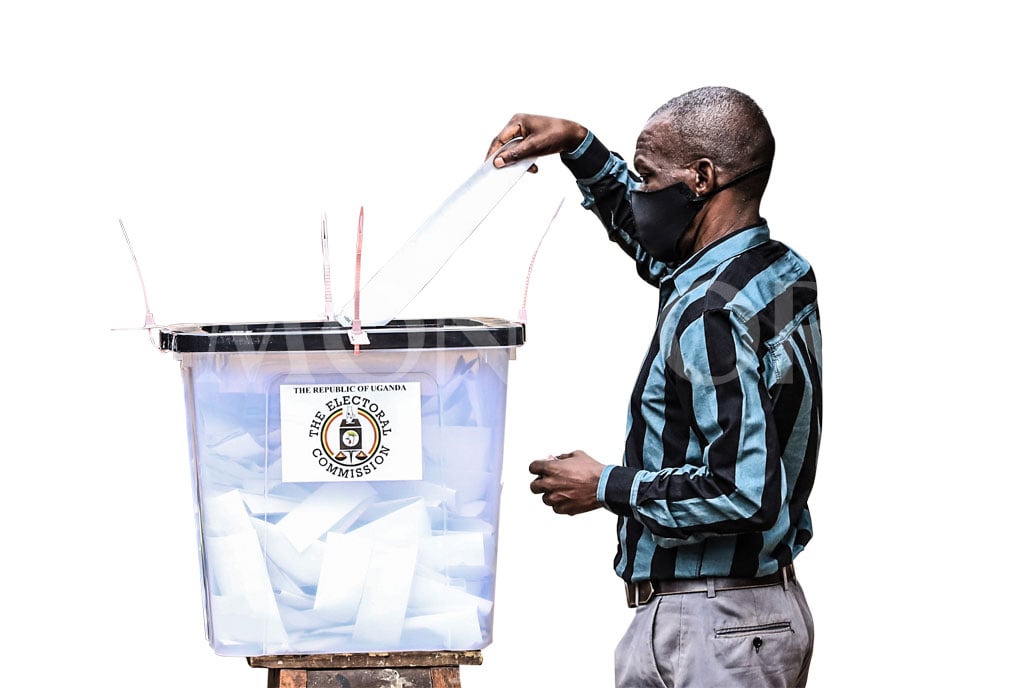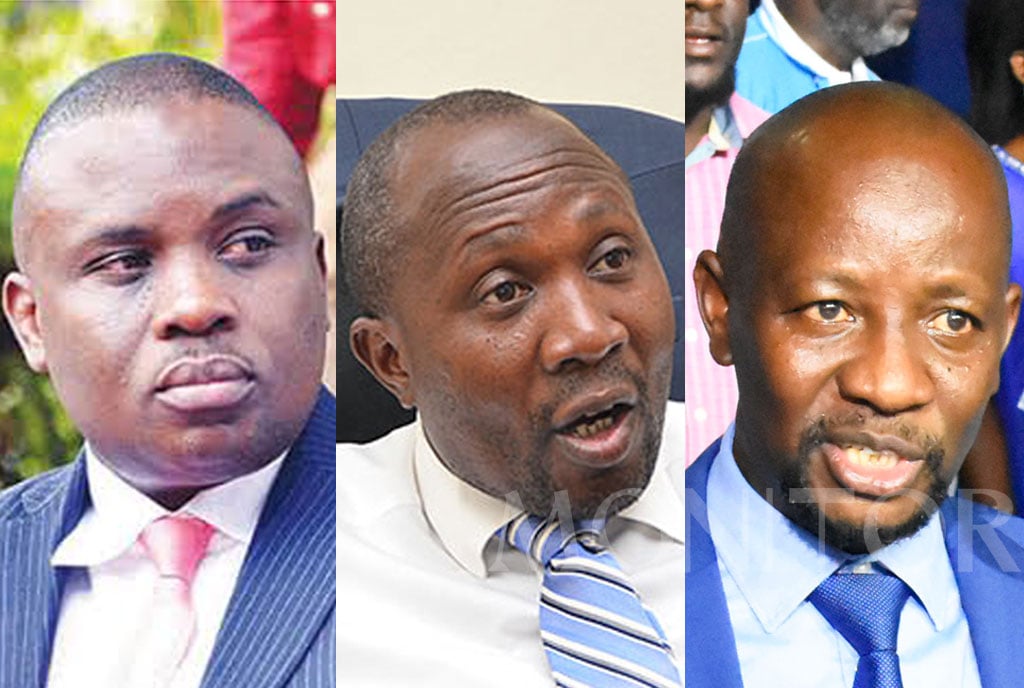EC sets nomination dates for 2026 polls

Left to Right: Prime Minister Robinah Nabbanja, EC chairperson Justice Simon Byabakama and Justice Minister Norbert Mao at the launch of the 2026 poll roadmap in Kampala yesterday. PHOTO | ABUBAKER LUBOWA
What you need to know:
- The elections are planned to be held between January 12 and February 9, 2026, but candidates for presidential, parliamentary and local government slots will be nominated in two years’ time, from June to October 2025.
The Electoral Commission (EC) has announced dates for nomination of candidates for the next elections, and asked the Executive and Parliament to expedite requisite constitutional and electoral reforms.
Releasing the 2026 poll roadmap in Kampala yesterday, the Commission said presidential, parliamentary and local government flag bearers will be picked between June and October, 2025.
The nominations of presidential candidates will be held on October 2-3, a fortnight after that of parliamentary contenders (on September 16-17), while flag bearers for district chair and mayoral offices will be nominated on September 16-17.
However, the first set of contenders to be chosen to run for offices will be village special interest groups on June 2-10 followed by their counterparts in municipalities, sub-counties and town councils on July 14-15.
Those dates are roughly two years away, but their disclosure is likely to excite aspirants for the political offices and pile pressure on incumbents, despite EC’s warning yesterday that it is not yet time for electioneering.
“The Commission wishes to caution political parties and organisations that the release of this strategic plan and roadmap is not meant to thrust the country into a frenzy of campaign-related activities for aspiring individuals, political parties, and organisations,” said EC Chairman, Justice Simon Byabakama.
A smooth ride to the next ballot, however, is contingent upon the government fulfilling two key conditions: speeding up amendments to the Constitution and other election-related legislations and providing money in time to bankroll preparatory activities between now and voting time.
The Justice Byabakama-led Commission has asked for Shs1.3 trillion to conduct the next ballot, which is part of the Shs2.4 trillion the electoral body requires to implement its four-year (2023/24-2026/27) strategic plan.
Officials told this newspaper on Tuesday that the main drivers of the costs for the next general elections include an expected increment in the number of parliamentary and local government constituencies by between several hundreds to thousands.
The Commission noted that there are projected to be 6 million more voters than those registered ahead of the last poll, rising to 24 million, meaning higher costs to enrol new voters and update the voters’ register as well as print more ballots papers.
The electoral body expects that Parliament will create nine new cities/districts or those it has already approved will come into force.
The country is expected to have eight new city divisions, 37 constituencies, 1,000 sub-counties, 9,000 additional parishes and 3,310 parishes and 9,500 villages by 2026.
This means there will be 14,000 parishes and 80,000 villages in total, substantially pushing up the administrative and logistical expenses.
Another change that the EC wants to implement in earnest is putting in place mechanism for prisoners and Ugandans in the Diaspora to vote, both of which will require changes to the Constitution and electoral laws.
Yesterday, Mr Gerald Siranda, the secretary general of the Democratic Party (DP), tasked his non-committal party President General, Mr Norbert Mao, who also doubles as the Justice and Constitutional Affairs minister, to disclose when he will table the reforms in Parliament.
Mr Mao instead walked government and EC officials and journalist into the world of storytelling, citing a boy who remained silent to a question his colleagues failed, only to emerge the cleverest with the correct answer.
It remained unclear if the minister recited the anecdote to imply that all commentators in government about the nature and timelines of legal reforms should be ignored until he pronounces himself on the matter.
During his homecoming fete in Gulu City last month, Mr Mao hinted that constitutional and electoral reforms will start within three months.
However, Prime Minister Robinah Nabbanja, who launched the 2026 election blueprint in Kampala yesterday, committed to follow-up on the reforms suggested by different stakeholders to enable the EC organise a fair and credible election.
“The NRM government which I am part of, is the master of democracy and, thus, we shall ensure that we support the EC in ensuring that enabling laws are put in place and in time,” she said.
At the launch of a similar EC roadmap for the last general elections, the government made a related promise, but the country reached the vote without the amendments to the supreme law and subsidiary laws and neither was the financing adequate.
Despite minister Mao yesterday side-stepping questions on the nature and timelines of required reforms, EC boss Byabakama said the most urgent change to the law they want is that allowing prisoners and Diaspora populations to cast the ballot in 2026.
“Similarly, the Commission appeals to the government to consider and approve the creation of new administrative units in a timely manner so that the electoral programme and budget are not destabilised,” he said, adding, “When this is not done, the impact on our preparations, particularly on the demarcation of electoral areas, re-organisation of polling stations and voter education is enormous.”
The EC announced that it intends to leverage advanced technology, for which the Supreme Court ordered there should be an enabling legislation, and implement other court orders in decisions on the 2001, 2006, 2016 and 2021 petitions challenging outcomes of presidential polls.
Some of the changes the highest court in the land ordered in its determination of the 2016 election petition filed by former Prime Minister Amama Mbabazi, included doubling the period for filing and determining a presidential election petition from a month to 60 days, and regulating participation of public servants and security forces in campaigns.
The Supreme Court also ordered all presidential candidates be afforded equal access to the public broadcaster, Uganda Broadcasting Corporation (UBC), and outlawed donations during elections.
The tango between the Opposition and the government over electoral reforms came to the head in June when the government thwarted the Opposition’s bid to bring to Parliament a Constitutional and Electoral Reforms Bill.
The government said it was working on a similar draft legislation, and its inordinate delay on Tuesday prompted the Leader of the Opposition, Mr Mathias Mpuuga, to excoriate the EC by mocking its election blueprint in the absence of reforms as nothing “other [than] a fraud”.
The electoral body has been under intensified scrutiny following allegations of violence, bribery and rigging that dogged parliamentary and district chair by-elections post-2021 ballot.
Observers and political actors who spoke to this publication at yesterday’s launch of the election roadmap asked for clarity on timelines for the intended reforms to inform planning by all stakeholders.
Minister Mao’s rejoinder was cryptic: “In this [conference] room, there are three types of people; we have the doers where the EC fall, the reactionaries who comment on each and everything the doers do and the commentators, who comment [on] what the reactionaries do. So, for us the doers, [we] are working as we persuade the commentators to join us.”
NOMINATION DATES
§ Oct 2-3: Presidential
§ Sept 16-17: Parliamentary
§ Sept 3-12: District chairs and mayors
§ July 14-15: Municipality, sub-county and town council Special Interest Groups (SIGs)
§ June 2-10: Village-level SIGs
Note: Presidential, parliamentary and local governments’ elections to be held between January 12 and February 9, 2026.
Preparations for elections to be held in February 2026 will cost Shs1.3 trillion.
What some of the stakeholders say...
Hellen Asamo, State Minister for Disability.
Let us have enough sign language interpreters and if possible EC should employ them for this period. The issue of using thumbs only will also leave out some elderly and people with disabilities.
Sadam Zakona: CG Kosovo party.
EC has gained some independence but the problem now is lack of political will to grant its total independence that’s why we see security operatives taking on polling stations.
Tanga Odoi, Chairperson NRM EC.
EC has said they are supposed to fill 1,900,008 elective areas in their roadmap but for us NRM we are having over two million and we shall start earlier to prepare ourselves in time.
Fred Ebil, Secretary General of UPC.
The NRM has continued with its norm of cheating elections. In Oyam they tried to cheat our victory but we showed them and that’s why I say this EC is the best ever.
Musa Kasozi, ED Youth after School Initiative.
The EC should take the debates to secondary schools to make our students more aware of the voting process because majority of them are potential voters.
Gerald Siranda, Secretary General of DP.
Government should be clear on which exact electoral reforms it is planning to table because we political parties need to know and plan early as well as put in our input.




